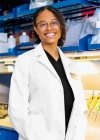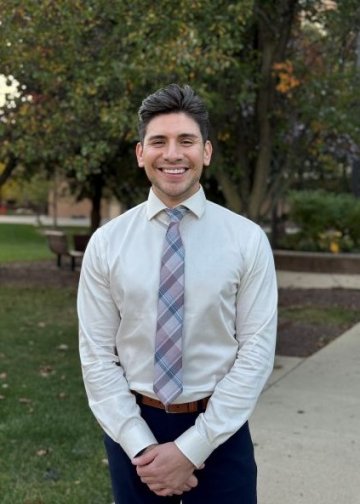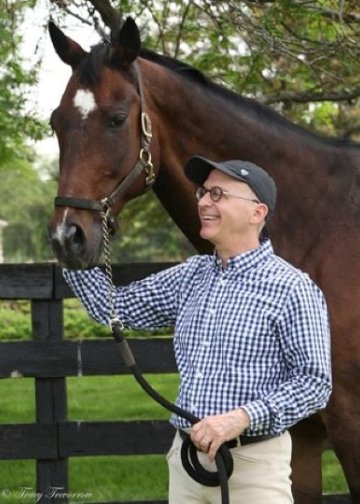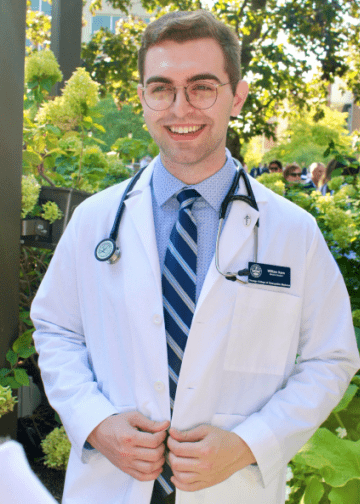
"When choosing a healthcare career, I was excited for the opportunity to provide dignified care, accessibility, and advocacy to people who come from communities like mine."
Hometown: Baltimore City, Maryland
Undergraduate degree: University of Maryland Baltimore County, B.A. in Biological Sciences
What inspired you to pursue a healthcare career?
Throughout my time in school, I always had amazing science teachers who made learning about the world around us fun and interesting. Whether it was physics, chemistry, or biology, science always felt like fitting together pieces of a puzzle to reveal a bigger story for how we experience the world around us.
During high school, with college on the horizon, I knew I loved science, but I had no clue what I wanted to do with my life. I distinctly remember the summer going into my junior year and googling "careers in science." It seemed like a good place to start! I was participating in my first summer internship at the time working at the University of Maryland Pharmacy School, and I figured a career in pharmacy would not give me the kinds of hands-on interaction with others that I craved. Exploring the human experience and how people become products of their biology and their environment was something I knew I wanted to delve into, especially those in marginalized communities like mine. So, I continued my search and stumbled upon a YouTube video of someone in dental school. Suddenly I knew exactly what I wanted to do. Working with my hands, life-long scientific learning, interacting with others, opportunities to bridge gaps among disparaged communities—all pieces of a puzzle that satisfyingly fit together to create the drive to pursue a career in healthcare!
How did your background and history factor into your career choice?
I often reflect on my time mentoring inner-city middle schoolers during my time in college. One day, a mentee turned to me with a skeptical look. He had discovered that I was from the West Side of Baltimore City, and he stared at me in disbelief as if he had never considered the possibility that someone from Baltimore could become a successful college student. At that moment I knew his mindset was beginning to change. Perseverance—a value we as mentors tried very hard to instill in our mentees, and a value I have come to integrate throughout my journey in dentistry. I believe in the idea that seeing it is believing you can be it.
I hope to inspire and be inspired by many more people throughout my career while helping to close those gaps, so that limited mindset doesn't persist. Additionally, growing up in Baltimore gave me the opportunity to see firsthand effects of how socioeconomic disparities can affect entire communities both physically and mentally— people who don't get their pain, mental health, or their right to certain treatments taken seriously. When choosing a healthcare career, I was excited for the opportunity to provide dignified care, accessibility, and advocacy to people who come from communities like mine as well as inspiring communities to take charge of their health and break down barriers to care.
Why did you decide to attend Midwestern University?
Being from Maryland, I truthfully did not know much about Midwestern before the application process, however, I was diligent when it came to selecting which schools to apply to. What struck me about Midwestern was the faculty support, the genuine and kind culture, and the feeling of preparedness from the students in and graduated from the dental program. Thinking back to fitting together pieces of a puzzle, I do not believe in the idea of getting anywhere without the support of others, especially when considering patient care. Midwestern focusing on the One Health and an interprofessional approach was a big draw for me to continue my education at such a holistic healthcare university where everyone can add their piece to genuinely make a difference for what tomorrow's healthcare will look like.
What about a Midwestern University education do you want to carry forward in your career?
In addition to navigating and developing interprofessional relationships for the sake of holistic patient care, as a part of the College of Dental Medicine, there are a few things I look forward to carrying with me past my time at Midwestern. Although I would like to challenge our curriculum to include more education surrounding tough topics and care practices within underserved communities, our faculty have taught us to be systematic, masters of detail so that we can confidently self-assess and provide consistent comprehensive care to all of our patients. We are taught to be life-long learners and always be sure to engage in evidence-based care. I look forward to carrying these with me to become a skilled and thoughtful practitioner for those of all backgrounds.
Anything else you'd like to add?
For me, getting into professional school was not a straight path. I’ve faltered and been humbled along the way, and it is the principle of grace that I am so grateful for. Midwestern University has granted me the opportunity to develop the skills necessary to uphold an inviting and comprehensive patient experience through shared decision-making, as well as genuinely caring about each one of us to hone in on the skills and artistry required to be an adaptable healthcare professional. I am excited to face new challenges and eventually emerge as a holistic professional in the oral and overall healthcare community.
Recently, I was granted a national fellowship opportunity from the American Association for Dental, Oral, and Craniofacial Research to fund the research I will be doing with Kristina Martinez-Guryn, Ph.D., RD, Associate Professor, Biomedical Sciences. We will investigate the role of gastrointestinal fungi in tongue-coating microbiota and taste receptors. We hope to get a better understanding of how changes in diet (high vs low-fat) may alter the fungi of the gut/tongue and how they may consequently influence the taste preferences of the host.



